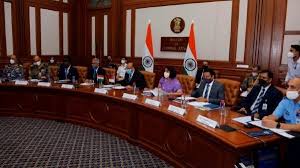
The Reserve Bank of India has announced a set of additional developmental and regulatory policy measures to improve flow of money and provide further support to the financial system, in the wake of rising COVID-19 infections in India and the world.
Daily Current Affairs Quiz 2020
Key-Points
The measures will ease the financial stress caused by disruptions due to the worst peacetime health and economic crisis of the last 100 years.
To mitigate impact of COVID-19 on ordinary citizens, RBI has decided to allow loans for non-agricultural purposes, against gold and jewellery, to be granted up to 90 per cent of the pledged value of gold ornaments and jewellery.
Banks will now be incentivized to address regional disparities in flow of priority sector lending. The weightage given for fresh credit given to priority sectors will be adjusted based on current credit flow of districts.
A special liquidity facility of ₹ 5,000 crore is being provided to National Housing Bank, to improve fund flow to the housing sector.
To address the heightened debt burdens being faced by borrowing firms, RBI has decided to enable lenders to implement a debt resolution plan for eligible corporate debts as well as personal loans.
In addition to the debt restructuring framework in place for MSMEs, RBI has announced that stressed MSME borrowers will be made eligible for restructuring their debt under existing framework, provided their accounts with the concerned lender were classified as standard as on March 1, 2020.
The capital charge on banks for holding Mutual Fund /Exchange Traded Fund will be brought in harmony with the charge for directly holding a debt instrument. The Governor has said that this will result in substantial capital savings for banks and boost the corporate bond market.
RBI is introducing an automated mechanism in e-Kuber system, its core banking solution, to provide banks more flexibility/discretion in managing their liquidity and maintenance of cash reserve requirements.
RBI is bringing in safeguards for opening of current accounts and cash credit (CC)/overdraft (OD) accounts, for borrowers availing credit facilities from multiple banks. This has been done in view of the concerns emanating from use of multiple operating accounts by borrowers.
RBI will set up an Innovation Hub in India, to further promote and facilitate an environment that can accelerate innovation across the financial sector.
To improve safety of cheque payments, a mechanism of Positive Pay is going to be introduced, for all cheques of value ₹ 50,000 and above. This will cover approximately 20 per cent of total cheques, and 80 per cent of total cheques by value.
A system will soon be introduced enabling retail payments to be made in offline mode using cards and mobile devices. Citizens will also be able to resolve disputes arising from digital payments, through an online dispute resolution mechanism.





